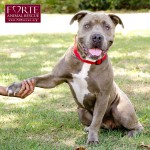January 27, 2011
One of my neighbors’ dog died. She was a Pit Bull he saved from the street over 10 years ago. She must have been 14 years old or so when she passed. She wasn’t particularly good with other dogs, so her guardian, I’ll call “Ron,” went through a lot to work with her, and she became a very obedient dog who would just sit and let other dogs pass by.
Months later, he told me that he was going to adopt a Pit Bull from a rescue group. I was jazzed to hear that he was rescuing again. He showed me the photos of soon-to-be his new dog. I told him that I was so proud of him for adopting a dog in need (he did not know I also run a rescue group). He was all smile and looked like an expectant father. The dog was supposed to be brought to him in a week.
When I ran into him a couple weeks later, I cheerfully asked if he had his new dog yet. He started yelling at me, “No! I’m getting my Pit Bull puppy shipped from the East Coast!”
“What happened to the dog you were going to adopt?”
“You, you, you, rescue people! Who do you think you are!?”
“Wait, wait, what happened?”
He calmed down and told me that the rescue group’s volunteer came to his place with the dog but declined him. I know where he lives, and I wouldn’t decline him for his living environment. He told me what happened was that the rescue group insisted that he had to put the dog in a crate and never give her the run of the house when he’s not home. People often return a dog to the rescue group if the dog has an accident or chews things in the house (even though it’s really not the dog’s fault), so this group was adamant about not giving the dog a chance to destroy things.
He refused, and the volunteer left with the dog. He said he did not want to confine the young dog in a crate, and told the volunteer he wouldn’t return the dog even if she chewed some stuff, but the volunteer wouldn’t budge. He also planned to hire a dog walker during the day when he works long ours, which he did for his late dog. He said that was not good enough for the rescue group; i.e., unless he’s at home, the dog must be confined in a crate.
It is understandable that the rescue group wanted the best for the dog as well as to avoid having the dog returned, but this rescue group has dozens of Pit Bulls needing homes, and Ron could provide the dog with a “good home.” Where do you draw the line? Which would be better for the dog—a flat-out refusal, or discussing options to make it work best for the dog?
I wonder if this group and the representative volunteer knew that they made him feel he had to buy a dog from a breeder. Sadly, indirectly as a result, one Pit Bull died in the pound because if he had adopted a dog from this group, it would have freed up space at the group to save another one, and that would have made space for another dog in the pound to stay alive.
Almost a year later, I’ve seen Ron walking his new dog he purchased from a breeder in Florida. Both look happy, and the dog is calm and friendly. Unlike his late dog, this new one is good with other dogs, so Ron takes her to daycare when he works long hours.
I also often hear people get declined for an adoption because they don’t have a yard. Sure, I wish I had a yard too, but I walk my dogs four times a day. A yard gives dogs neither exercise nor socialization. When you don’t have a yard, you are forced to walk your dog, rain or shine. That is correct; even when it rains, those of us without a yard have to walk our dogs.
I’d rather place my rescue group’s dogs with an apartment dweller, who takes the dog out everyday, than someone who leaves the job to his yard because then the dog’s life becomes like Aung San Suu Kyi’s. The difference being, in 15 years, the dog would be dead, instead of being freed.
I’ve also placed a dog with a lady in a wheelchair. This dog weighs only 7 lbs., and she has a devoted animal-lover husband who would walk the little dog. She was also a fellow rescuer herself, and I was surprised when she told me, “You were the only one who didn’t write me off because I’m in a wheelchair. Nobody wanted to let me adopt a dog.”
Six years later, Jorgie is healthy, happy and still the love of her life. She’s going through some health issues now, and Jorgie gives her the strength to fight for her life. She says he’s “the light of my life.” It makes me cringe to think about anyone denying her a dog.
Every rescue group has different standards, but what I know from my experience of over 10 years is that one does not fit all. Most rescuers are volunteers, and we have limited time to start with, so I get it that it’s a drag when we have to spend extra time to evaluate each case individually and educate people. But that is part of what differentiates rescue groups from the pound.
It’s when you accept the reality that people sometimes need help in order to become good canine guardians, you will spend the extra time with a positive attitude. And I believe such kindness is what leads to successful adoptions.
Marie Atake is Founder & President of Forte Animal Rescue and a former Commissioner on the Board of L.A. Animal Services.






